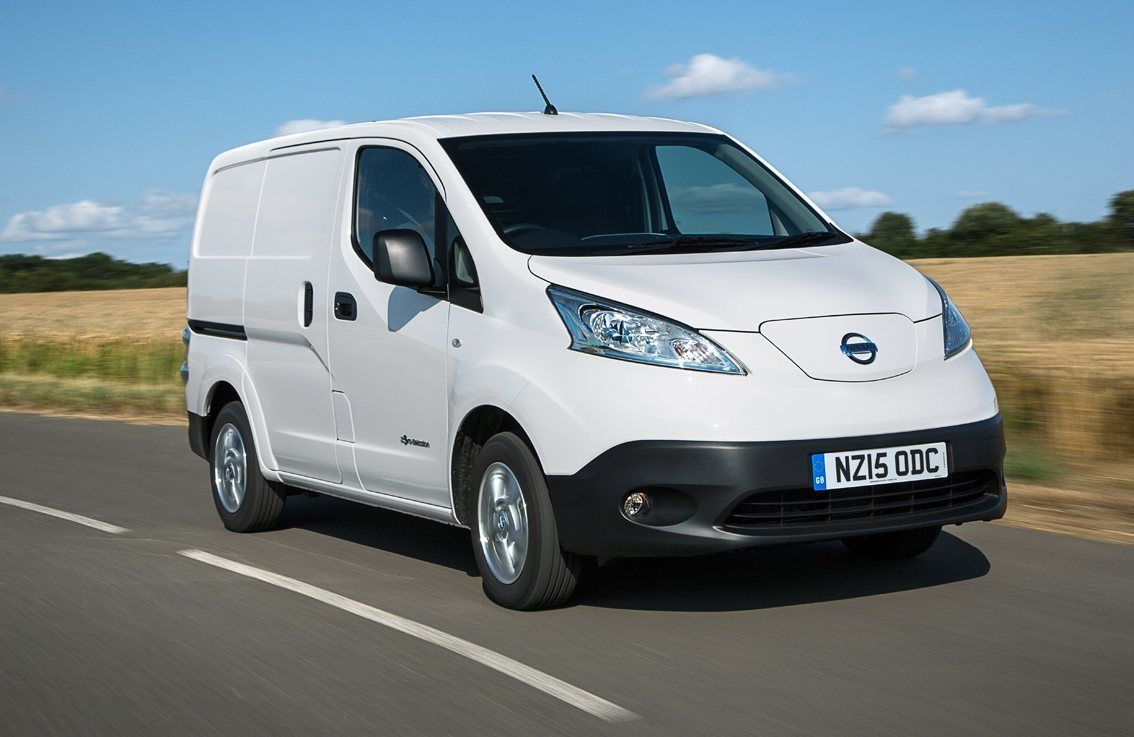Nissan e-NV200 (2014-2021) Review
Written by Andrew Brady
Quick overview
Pros
- Very comfortable and quiet
- Amazing running cost savings compared to diesel
- Absolutely no compromise on space or versatility.
Cons
- Expensive
- Range anxiety
- Quite rare on the used market
Overall verdict on the Nissan e-NV200
"As an ell-electric van with a theoretical three-figure mileage range and no compromise on loading capacity, the Nissan e-NV200 is a 'game changer' according to its maker."
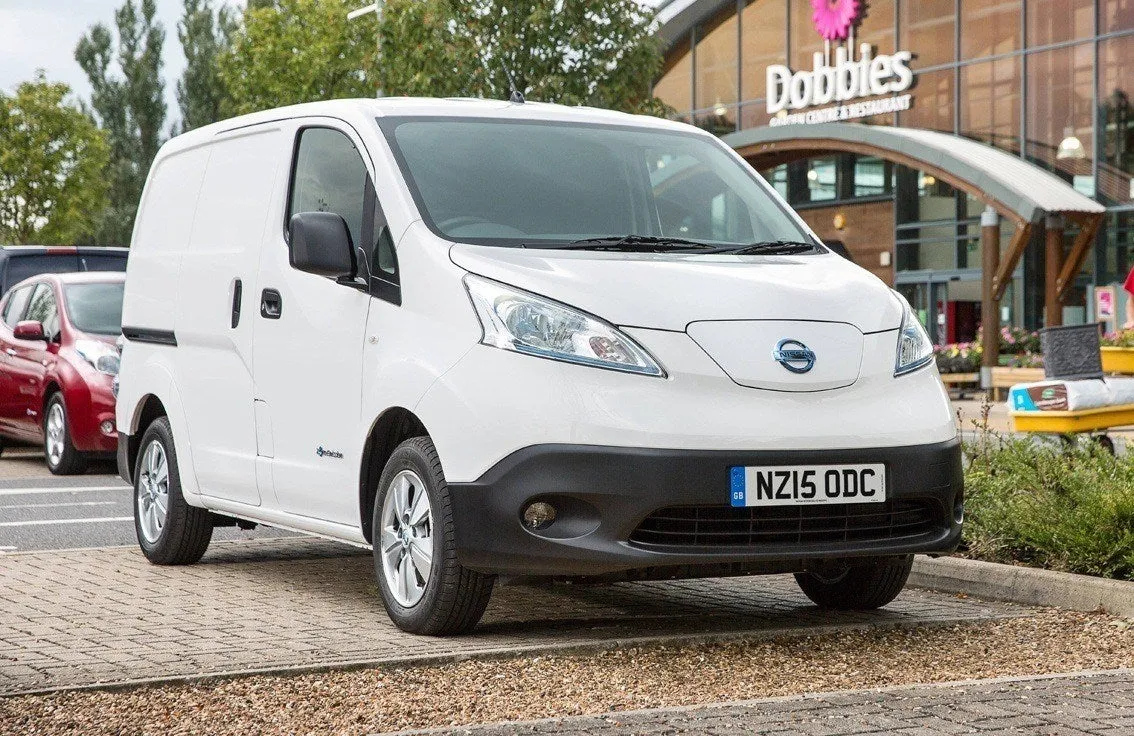
That may well be the case, although the game started a while ago – Peugeot put the Partner Electric on sale in 2013 and Renault sells the Kangoo Z.E.
Like the regular Nissan NV200, van and combi versions are available, making this the basis for extremely capacious family transport – and effectively the UK’s first all-electric MPV. As a workhorse, the e-NV200 van provides 4.2 cubic metres of load space and a maximum payload of 705kg.
So without any practicality compromises, the only thing left to cause a van man any anxiety is that most anxiety-inducing issue of all electric vehicles: its range. And arguably it’s more prevalent here, because a van that runs out of charge during a delivery is a van that’s losing its business money.
Nissan has worked hard to counter this problem, first of all by giving the e-NV200 batteries enough for a theoretical 106-mile range, which was extended to a maximum of 124-miles in 2017 with the fitment of a larger battery.
Nissan admits that the e-NV200 won’t work for everyone, but also estimates that around a third of vans on the road never do more than 80 miles in a day – a significant target market to entice into, as Nissan puts it, "never buying diesel again".
Looking for a used van for sale? We've got 100s of Nissan Approved Used Cars for Sale for you to choose from, including a wide range of Nissan e-NV200 cars for sale.
Comfort and design: Nissan e-NV200 interior
"We’re already strong advocates of the NV200, thanks in no small part to its excellent use of space in a relatively compact body. And because Nissan has packaged the Leaf’s drivetrain without losing any of that space, we remain impressed."
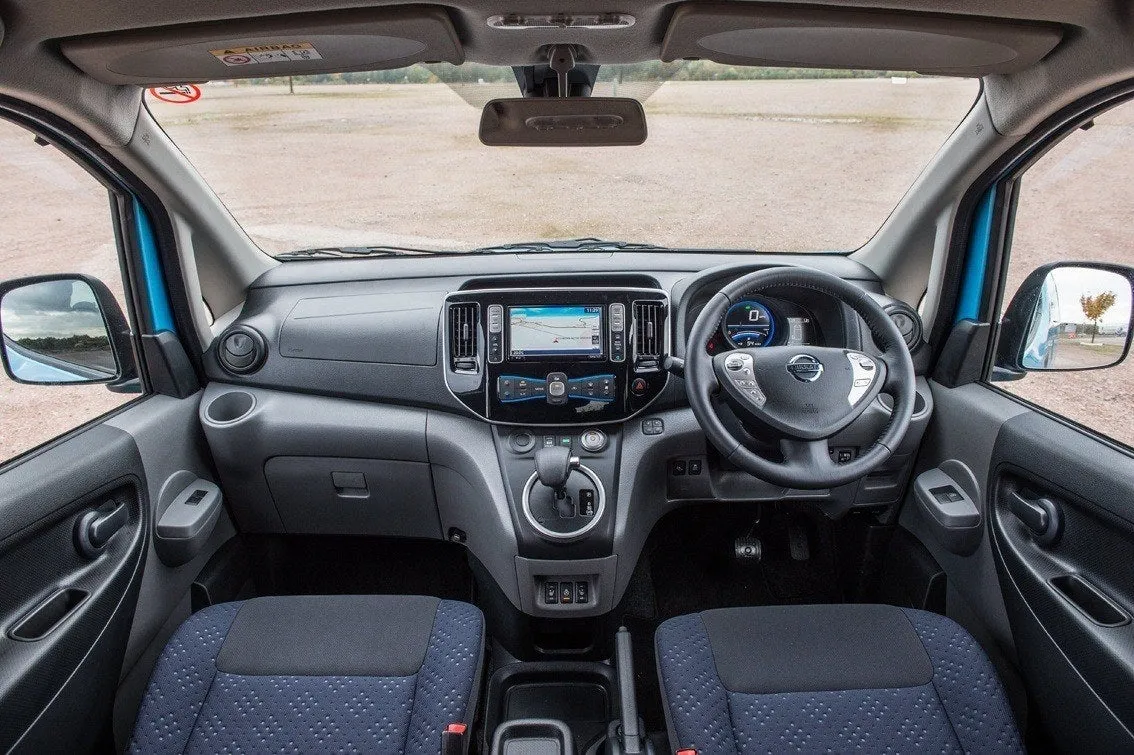
With the batteries packed in a thin slice under the flat floor, the load bay will swallow two standard Euro pallets, despite suffering from the usual wheel arch intrusion. And while a top-hinged tailgate is standard in the family-friendly Combi, the van gets an asymmetrical door arrangement that doesn’t encroach into the loading aperture.
The cabin itself is no-frills in terms of design and material use, but it’s cleverly designed, with no less than 13 storage places, including plenty of places to keep mugs and mobile phones, plus under-seat storage for keeping stuff hidden away.
Our only real criticism is the front-hinged oddments box between the front seats, which is designed to have things placed on top but can be flipped forward – creating the possibility of launching whatever’s on top of it onto the floor.
Want to add a little bit of luxury? Then the £300 Heat Pack is the way to go – it adds a heated steering wheel and front seats, as well as heated door mirrors that can quickly clear condensation on early morning starts.
Quality and finish
The quality of the Nissan e-NV200's interior plastics aren't great – they're all hard wearing, unwielding and scratchy, but they should at least resist large impacts and be easy to keep clean, both handy characteristics for a working van. Shiny black plastics borrowed from the Leaf electric car lift the cabin, but not significantly.
Infotainment: Touchscreen, USB, sat nav and stereo in the Nissan e-NV200
Tekna versions of the Nissan e-NV200 come with Nissan's Connect infotainment screen fitted as standard (it's a £1200 option on all other models), which includes handsfree calling and Bluetooth music streaming, you also get 12V and USB plugs. The Connect system can track the van's movements as well as alert you when it's fully charged and allow you to stop and start the climate control system remotely. Sadly, you don't get either Apple CarPlay or Android Auto.
Space and practicality: Nissan e-NV200 boot space
The conversion from conventional to electric power hasn't harmed the Nissan e-NV200's cargo-lugging capacity – it can carry the same 4.2 cubic metre load as any other NV200. Its 701kg payload limit, meanwhile, is about 50kg less than a diesel can lug.
The cargo bay's dimensions sit at 2040mm long, 1500mm wide and 1358mm tall. Need to carry something longer? No problem – for £240 you can have a mesh partition wall that means you can feed items up to 2.8m in length up to the windscreen.
Access to the load bay is brilliant, you get a low floor 524mm off the ground and rear doors that open 180 degrees, you also get two side doors that leave an 1171mm opening and make it easy to get things out the front of the load bay when the van is fully loaded.
The Nissan e-NV200 dimensions are 4650mm long, 2011mm wide and 1860mm tall.
Handling and ride quality: What is the Nissan e-NV200 like to drive?
"You can’t change the game without playing it first, so the Nissan e-NV200 needs to function properly as a van. It does that, but its electric nature bestows upon it an overarching sense of calm that’s definitely not the hallmark of most vans. It’s actually a relaxing drive."
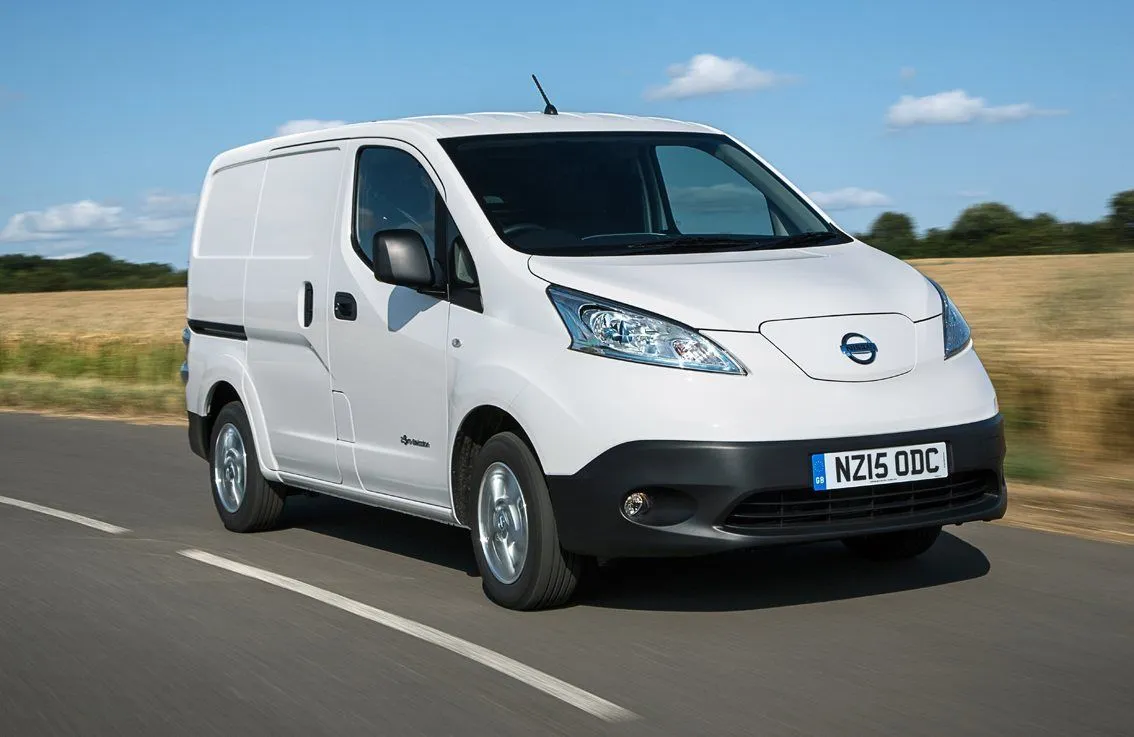
Nissan claims 'car-like handling and responsiveness' which the forces of physics ensure isn’t quite true. Nonetheless, the distinct lack of diesel clatter in the e-NV200 contributes to an almost incongruously refined driving experience.
Ultimately the idea of a compact van such as this, and rivals like the Ford Transit Courier, is to be manageable around town – and in this respect the e-NV200 is very car-like. The flat angle of the steering wheel, which inevitably leads to a ‘long-arm, short leg’ driving position, makes getting truly comfortable a little tricky, but the sharpness of the steering rack and tight turning circle make it an easy thing to place – especially important in busy towns.
And in town the ride quality is excellent, although the dense battery pack – and the beefed up suspension required to accommodate it – means that the e-NV200 will occasionally thump into the road with a jolt. The e-NV200’s front suspension is taken from the Leaf, while the rear torsion beam is taken from the American market NV200, which is intrinsically stronger, for whatever reason.
What engines and gearboxes are available in the Nissan e-NV200?
The drivetrain is, not surprisingly, pretty much lifted straight out of the Leaf, although Nissan’s van department has made the battery pack 7.5kg lighter still. The electric motor generates 109PS, though that’s a far less relevant number than the 254Nm of torque, which is a better indicator of the e-NV200’s stuff-carrying ability.
The main in-town benefit of the e-NV200 is the electric vehicle’s trademark torque curve – or plateau, rather, with the maximum figure available from zero rpm, making for an extremely responsive throttle in the van's main mode. In Eco mode the right pedal needs a lot more shove, which lessens the effect but improves battery life.
Most importantly, in the world of heavy load bearing, this instant torque delivery gives the e-NV200 a massive advantage over anything with a conventional engine.
Refinement and noise levels
The Nissan e-NV200 is as quiet as a luxurious Mercedes S-Class through town, it's motor makes no noise and the artificial sound the van produces (to warn pedestrians that it is approaching) is soothing rather than annoying.
The downside of the silent powertrain is that wind and road noise aren't masked by the hum of an engine at higher speeds. On the bright side, the Nissan's short cruising range means you'll not be driving on the motorway for very long.
Safety equipment: How safe is the Nissan e-NV200?
The Nissan e-NV200 was tested for safety by Euro NCAP in 2014, when it scored three stars – which isn't great. In fact, testing has changed so much since then, NCAP actually classifies that result as 'expired' and it would score even less if it was tested under the latest procedures.
On the upside, a drivers airbag and anti-lock brakes come fitted as standard, Acenta models add a passenger and side airbags.
Maximum EV range in the Nissan e-NV200
"The Nissan e-NV200 has a 40kWh battery and Nissan claims a range of 187 miles from a single charge. Expect that to be more like a 120 miles in a mixture of driving and even less on long motorway slogs."
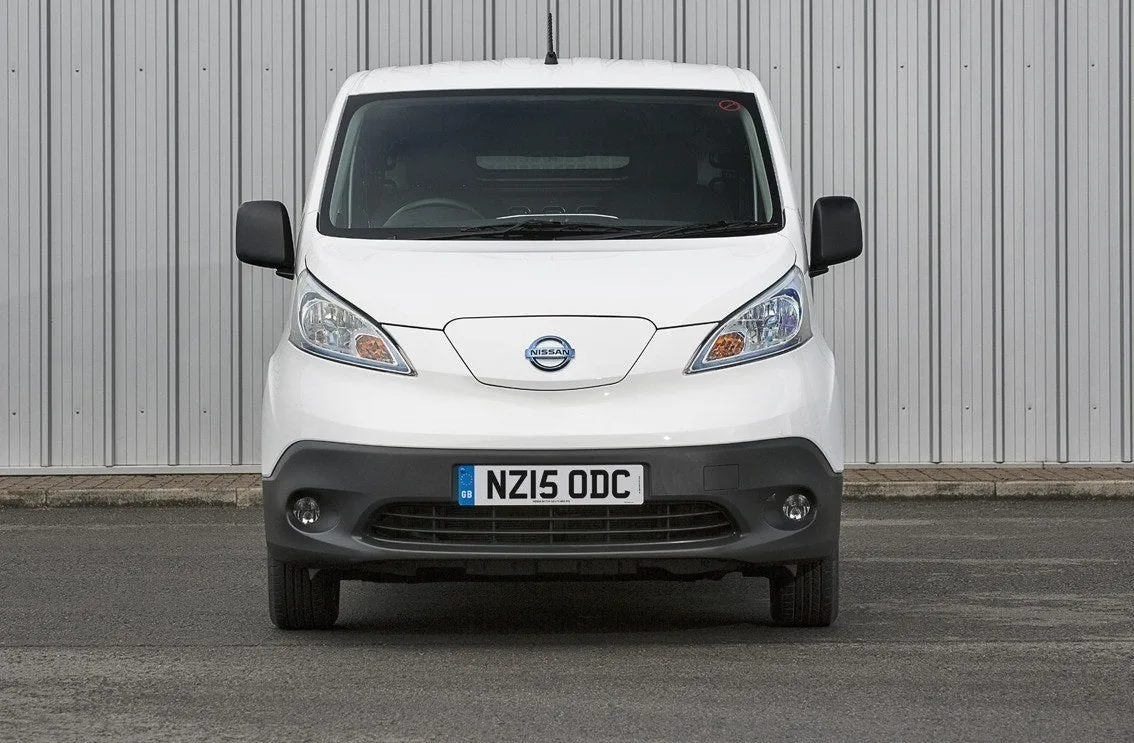
It’s an obvious observation, perhaps, but the difference between watching the battery percentage sink while the e-NV200 is close to its 76mph top speed, and its thriftiness around town, is a very stark one – the e-NV200 is certainly a more calming companion in built-up areas, for a few reasons.
On matters of battery life, the transmission can operate in two modes: D and B, where D is standard drive mode and B activates a “more aggressive” energy recapture mode, giving the effect of strong engine braking when the accelerator is lifted. It's the main reason the Nissan holds its range better in town.
Charging times: How much does it cost to charge the Nissan e-NV200
Basic e-NV200 Visia models don't come with a rapid charge facility, so getting a full charge will take around 7.5 hours.
The rest of the range has a rapid charge facility, so the Nissan can juice its battery from 20 to 80 per in 40 minutes – although it'll cost you double the price of charging at home.
Which brings us neatly to the the good old home socket, of course, which is where most will find their power, overnight, depending on the amp rating of the supply, charging can take between four and 12 hours, but it will cost you less than a tenner.
How reliable is a Nissan e-NV200?
The Nissan e-NV200 should be very reliable. Its electric motor is simpler and requires less maintenance than a diesel engine and you also don't have to worry about replacing engine oil, spark plugs or an exhaust. Its regenerative brakes also mean brake pad and disc wear will be greatly reduced versus a diesel model.
The Nissan comes with a five-year warranty for its mechanical parts and eight-year cover for the battery.
Insurance groups and costs
The Nissan e-NV200 hasn't got published insurance groups, but the old model sat in group 8 and we would expect the current car to stay in a similar position – that would make it about to same to insure as rivals such as the Renault Kangoo E-Tech Electric.
VED car tax: What is the annual road tax on a Nissan e-NV200?
Because it is electric, the e-NV200 doesn't pay any road tax and it's also exempt from paying either the London Congestion Charge or the ULEZ, meaning it is ideal if you deliver in central London.
How much should you be paying for a used Nissan e-NV200?
"The Nissan e-NV200 has been on sale since 2014 so there are come cracking savings to be made by buying used."
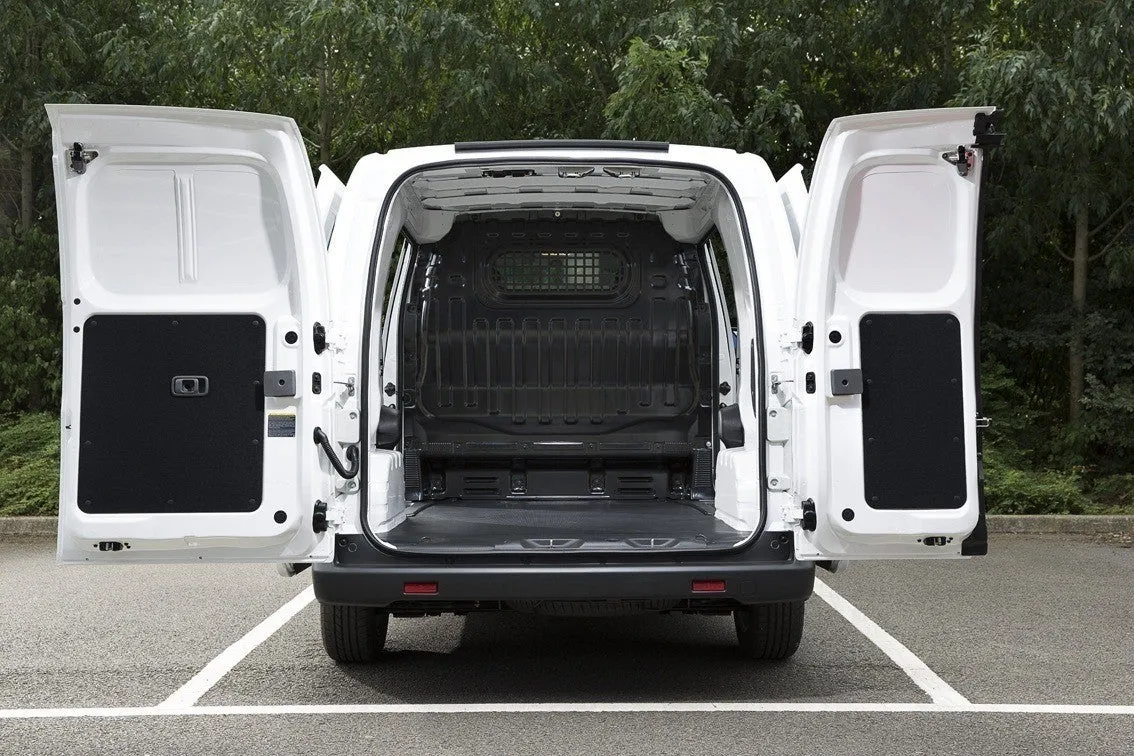
An Acenta 2014 model with just 30,000 miles on the clock could be yours for less than £11,000 excluding VAT – out of warranty, sure, but it should still have plenty of life left to give.
A pre-VAT price of £16,000 is enough to get you behind the wheel of a 2017 model, with a little over 10,000 miles under its wheels and the balance of Nissan's five-year warranty to reassure you. Or you could go all out and buy a pre-registered new example for less than £30,000 before VAT.
What equipment does the e-NV200 come with?
A decent list of standard equipment makes the Nissan e-NV200 a comfortable van to spend a lot of time in – you can choose from Visia, Acenta and Tekna models.
Visia is the entry-level model and it comes with 15-inch steel wheels and halogen headlights to prove it. Creature comforts are limited to electric windows and a two-speaker stereo with AM/FM radio and Bluetooth, plus you get a passenger seat that folds flat so you can use its backrest as a table.
Acenta models can be spotted by their front fog lights, although the most significant upgrade is their ability to be charged using a rapid charger. They also get handy accessories such as air-conditioning, a reversing camera and cruise – features that make Acenta the pick of the range.
Haul yourself to the giddy heights of a Tekna model and you'll get nifty 15-inch alloy wheels, as well as automatic lights and wipers. The inside looks smart too, because you get a colourful infotainment screen with built-in sat-nav.
Ask the heycar experts: common questions
What is the range of a Nissan e-NV200?
Is the Nissan e-NV200 AWD?
What is the longest range electric van?
Get our latest advice, news and offers
Keep me updated by email with the latest advice, news and offers from heycar.
By submitting you agree to our privacy policy
